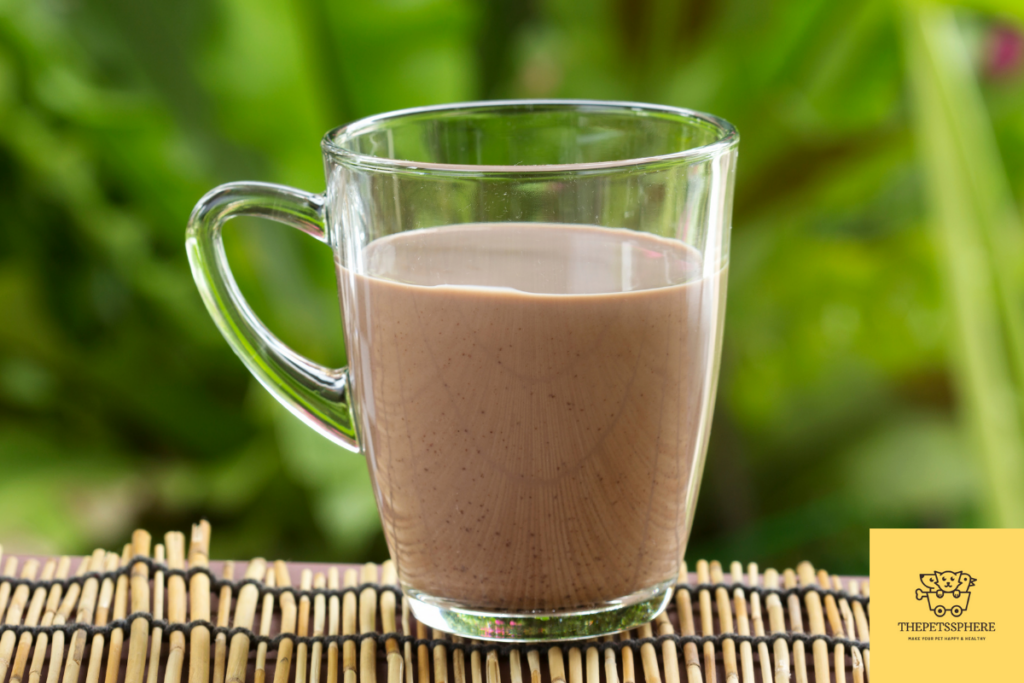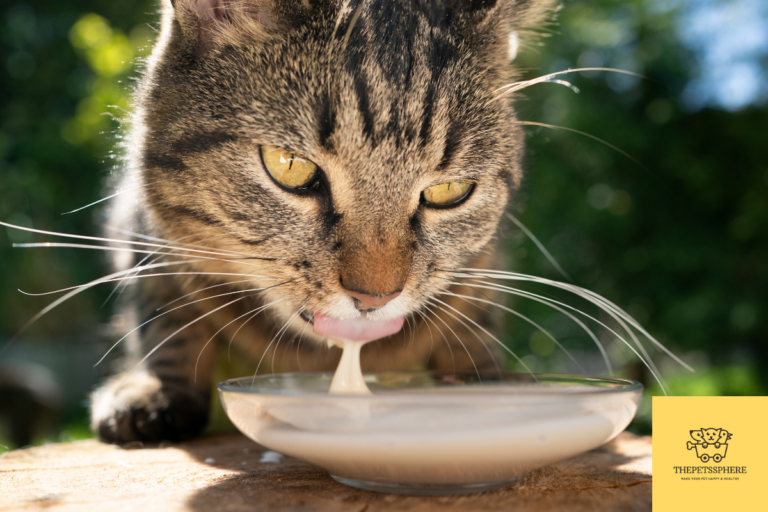It can be very tempting to give your cat some chocolate milk, but can cats drink chocolate milk? The answer is “No”.
Theobromine, an ingredient in chocolate, can cause problems with the cat’s heart and can lead to death. This can happen if you feed your feline friend a lot of chocolate or just one small piece. The presence of sugar and lactose in chocolate milk may trigger Gastrointestinal Upset in your kitty.
This article will explain what chocolate milk does to cats and if it can have any adverse effects on their health.

6 Reasons Why Your Cat Should Not Drink Chocolate Milk
Cats are curious and mischievous creatures by nature. Often, their curiosity can result in them getting into things they shouldn’t be touching. One such thing is chocolate milk. Cats should not drink chocolate milk because it has a high sugar content that can lead to diabetes and other health problems for cats over time when consumed regularly. Here are six reasons why your cat should not drink chocolate milk:
1) Chocolate milk contains high sugar content: The sugar content of regular cow’s milk with 2% fat is 12 grams (4 teaspoons); the sugar content of whole cow’s milk with 3% fat is 15 grams (5 teaspoons). A cup of semi-sweet dark chocolate contains 19 grams (6 teaspoons) of sugar alone! This means there can be as much as 36 grams (12 teaspoons) of sugar in a can.
2) Chocolate contains caffeine: This could result in hyperactivity and vomiting in your kitty.
Caffeine has a stimulating effect on humans and causes an increase in heart rate, blood pressure, and urine production which may make it difficult for your cat’s kidneys to handle the extra fluids being passed through their system.
3) Chocolate contains Theobromine: Theobromine, an ingredient found in cocoa beans, causes diarrhea and Gastrointestinal (GI) problems.
Theobromine can cause your cat to have diarrhea or GI issues such as vomiting and can also lead to death if consumed in large amounts. A piece of chocolate the size of a dime can be enough for an adult cat, but it would take about eight pieces to kill a kitten!
4) Lack of Fructokinase in cats: A cat’s liver cannot effectively break down the chemicals found in chocolate milk. The lack of fructokinase prevents their bodies from breaking down fructose into glucose once they consume too much of it.
5) Cats are lactose intolerant: Most of the cats are lactose intolerant. It’s best to abstain from offering dairy products to your cat. Cats don’t need to drink milk after they are weaned from their mother’s breast milk. After her kittens are weaned at about 8 weeks, a mother cat would only need to produce enough milk for her new baby rather than spend the energy-producing milk for an older cat.
If you give your cats lactose-free or even regular chocolate milk, it will overload their system with something that they don’t need and may lead to diarrhea along with a terrible-smelling litter box!
6) Chocolate milk can cause obesity and weight gain in cats: The nutritional value of chocolate milk is not the same as that of cat food. Chocolate milk contains a lot more calories per cup, which could put your cat’s diet out of balance and lead to obesity.
What Happens if my Cat Drinks Chocolate Milk?
If she is drinking chocolate milk, then the worst that happens is diarrhea.
Chocolate milk is the least harmful form of chocolates that cats can get because it contains minimal sugar and caffeine, unlike most other cocoa products.
Cats also don’t produce alkaline phosphatase which helps metabolize these healthy foods–breaking them down into nutrients and energy that the body needs to run smoothly. Because feline’s kidneys are not meant to process such quantities as humans’, drinking too much chocolate milk could lead to vomiting or diarrhea, which makes sense when you take a step back and think about how we can’t safely drink that much chocolate milk either.
What you need to do is to closely monitor your feline friend after she has consumed chocolate milk. If she doesn’t vomit or has diarrhea, then there should be no problems.
But if you are thinking it may cause some problem, then you should consult with your veterinarian right away.
What Kind of Milks Can Cats Drink?
Cats are notoriously picky animals. We all know this to be true. They don’t like change, they have certain eating habits, and they get mad when you try to pet them on their head or stomach. But what about milk? Is it safe for cats to drink cow’s milk? What other types of milk can a cat drink if not cow’s milk?
The answer is yes! Cats can drink 5 different types of milk: soy, coconut, almond, rice and goat’s milk. Now I’ll go into more detail about the benefits of each type of milk as well as how much water your cat should consume daily in order to stay hydrated while drinking these types of milk.
Soy Milk
Soy milk can be good for your cat if they have a dairy allergy. There is no lactose in soy milk so it can help with stomach issues that cats may develop from drinking regular cow’s milk.
However, there are also other reasons why soy milk is beneficial for cats:
1) It contains omega-3 fatty acids which help with brain function and heart health.
2) It helps maintain a healthy weight by curbing appetite.
3) It has calcium which supports strong bones and teeth. There are many types of soy milk available on the market today, so make sure you get one that doesn’t contain any added sugar or artificial flavors. Cats can thrive on a diet made up of only soy milk, but it can cause diarrhea if consumed too much.
Almond Milk
Almonds contain vitamin E, which is a great antioxidant to protect the immune system and heart health of your pet. It’s high in vitamin D which promotes bone health and can also help with the symptoms of arthritis. It also contains omega-3 fatty acids that are vital to your cat’s skin and coat condition.
Rice Milk
Rice milk has a high amount of potassium, which can be good for the heart and can also help with muscle function. Rice milk contains no lactose, making it an ideal option for those who suffer from lactose intolerance or allergic reactions to cow’s milk products. It also has more calcium than almond or soy milk.
Coconut Milk
Coconut milk can contain vitamin C that can promote healthy skin as well as stimulate your cat’s immune system.
Coconut milk can be good for your cat if they have a dairy allergy or lactose intolerance, as it contains less lactose than cow’s milk and is easier to digest. It also has more potassium than almond or soy milk which can be beneficial for heart health and can help with muscle function.
Goat Milk
It turns out that there are several reasons why cats may prefer drinking goat’s milk over cow’s milk.
1) Cats have difficulty digesting lactose; goat’s milk contains less lactose (30% less lactose) than cow’s milk and is easier on the stomach (hence why some people who are allergic to dairy also do not experience any symptoms from consuming goat products).
2) The calcium content in goat’s milk can also help prevent tooth decay and can help with the absorption of iron.
3) The proteins in goats’ and cows’ milk differ; cow’s milk has more casein protein while goat’s milk has more whey protein.
Final Thoughts
As we have discussed earlier, your cat will not enjoy a glass of chocolate milk.
Cats cannot drink the sweetened beverage and it could lead to some serious health issues if they consume too much sugar or lactose in their diet.
If you do want to give your feline friend something sweet, try offering them some canned tuna or salmon with water instead of milk! Remember that sugar is toxic for cats too.
A little bit won’t hurt but it can eventually lead to liver failure in the long run. It might seem like an innocent treat, but remember that chocolate could be very harmful to our furry friends if ingested!
Similar cats eat questions
- Can cats eat raw chicken
- Can cats eat bread
- Can cats eat popcorn
- Can cats drink evaporated milk
- Can cats get sick from eating mice
- Can cats eat lobster
- Can cats eat chicken nuggets
- Can cats eat bologna
- Can cats eat cheerios
- Can cats eat pine nuts
- Can cats eat imitation crab
- Can cats eat zucchini
- Can cats eat beef jerky
- Can cats eat figs
- Can cats eat oranges
- Can cats eat cashews
- Can cats eat pancakes
- Can cats eat frogs detailed guide and potential safety concerns
- Can cats eat pizza
- Can cats eat parsley
- Can cats eat vanilla pudding
- Can cats eat radishes
- Can cats eat beans
- Can cats have dog treats

